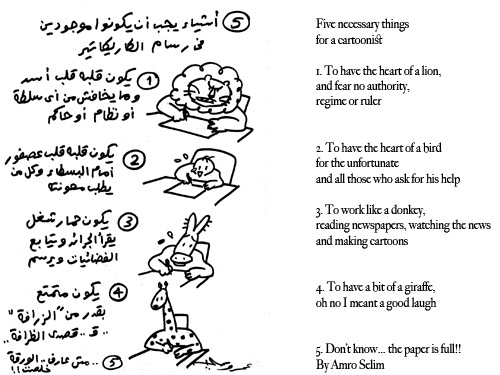When he died with the depression that had stayed with him since the 1967 Egyptian defeat by Israeli forces, Egypt’s most renowned colloquial poet couldn’t know that on the 25th anniversary of his death people would be celebrating their triumph in a much longer battle with their own government.
Born to a middle-class family in Shubra in 1930, Salah Jaheen studied law and started his career in journalism. A gifted cartoonist, a pioneering colloquial poet, a lyricist, an editor-in-chief and a playwright, Jaheen mastered all the arts that he ventured into, capturing the hearts of his audience with the profound simplicity of his work.
The poet’s love for Egypt overflowed in his work. His masterpiece “In Egypt’s Name” remains one of the most heartfelt pieces written on Egypt. The poem captures the mixed feelings that most Egyptians have toward their country.
"History may say what it wishes in Egypt’s name, Egypt, for me, is the most beloved and most beautiful of things. I love her when she owns the earth, east and west. And I love her when she is down, wounded in a battle. I love her fiercely, gently and with modesty. I hate her and curse her with the passion of the lovesick.”
The poet’s vow to love Egypt through good and bad has passed the test of time.
Jaheen lived through the era of victory and hyped sense of nationalism that followed the 1952 revolution that ended British colonialism. During that time, Jaheen earned the title “Poet of the Revolution” by writing most of the patriotic songs sung by Abdelhalim Hafez supporting President Gamal Abdel Nasser and his pan-Arab nationalism and socialist agenda.
Jaheen also endured the national catastrophe that was the 1967 defeat, which led to a wave of crushing disappointment throughout Egypt and the Arab world. In the same way that his celebration of Egypt’s glory days exceeded those of the average person, the 1967 defeat hit him harder than most. He entered into a spiral of depression that he had not recovered from when he died in 1986 at the age of 55.
Although he is not here to comment on the 25 January revolution, many of Jaheen’s timeless poems are relevant to post-revolution Egypt.
The ongoing trials of former officials, who were brought down by the fortunes that they accumulated over their years in power, are a reminder of Jaheen’s words:
“They said politics is generally lethal, and its seas are rough my son not made of ostrich feathers, dive in and you’ll find all those who drowned carrying fortunes, and those who remained light are the ones who floated.”
Jaheen also described the state of the Egyptian youth, which led to the eruption of the revolution, decades in advance: “I am young but I am over 100 years old, lonely but my inside is crowded, afraid but my fear is from myself, quiet but my heart is full of talk.”
Jaheen has also contributed to the Egyptian folklore with his operetta “The Big Night” which is still being featured in the Cairo Opera House among other places. The operetta details the events of Egypt’s popular celebrations, capturing the essence of the Egyptian society.
Twenty-five years after he died in despair over Egypt’s future, Jaheen has unknowingly contributed to the Egyptian revolution by capturing, through his work, the patriotism and rebelliousness of the generation that started the revolution.

